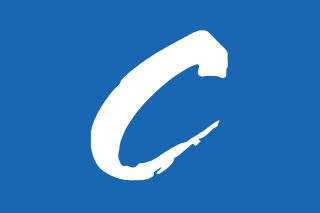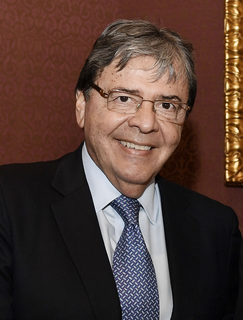
Álvaro Uribe Vélez is a Colombian politician who served as the 39th President of Colombia from 7 August 2002 to 7 August 2010.

The Colombian Liberal Party is a centre-left political party in Colombia. It was founded as a classical liberal party but later developed a more social-democratic tradition, joining the Socialist International in 1999.
This article gives an overview of liberalism in Colombia. It is limited to liberal parties with substantial support, mainly proved by having had a representation in parliament. The sign ⇒ means a reference to another party in that scheme. For inclusion in this scheme it is not necessary for the parties to have labeled themselves as a liberal party.

The Alternative Democratic Pole is a social democratic political party in Colombia.

The Colombian Conservative Party is a conservative political party in Colombia. The party was formally established in 1849 by Mariano Ospina Rodríguez and José Eusebio Caro.

Radical Change is a political party in Colombia.

Presidential elections were held in Colombia on 28 May 2006. Álvaro Uribe was re-elected as President for another four-year term, starting on 7 August 2006. Uribe obtained 62.35% of the vote, surpassing the 50% needed to avoid a runoff against the second-placed candidate.

The Democratic Colombia Party was a political party in Colombia founded in 2003. After 2006, the small party was decimated by the parapolitics scandal, in which four of its five congressmen were forced to resign and several found guilty.
Colombia First was a non-profit foundation and later conservative political movement in Colombia which supported the candidacy of Álvaro Uribe in the 2002 and 2006 presidential elections.

Juan Manuel Santos Calderón is a Colombian politician who was the President of Colombia from 2010 to 2018. He was the sole recipient of the 2016 Nobel Peace Prize.

Presidential elections were held in Colombia on 26 May 2002. Álvaro Uribe, the candidate of the recently created Colombia First movement, was elected, receiving 53% of the vote by the first round. Uribe took office on 7 August.

The Green Alliance is a Colombian political party located in the centre of the political spectrum. The party advocates social justice, electoral reform and economic sustainability.

Germán Vargas Lleras is a Colombian politician who recently served as Vice President of Colombia under President Juan Manuel Santos Calderón. A member of the Radical Change political party, he served four consecutive terms in the Senate, having been elected in 1994. German Vargas also served in the Cabinet as the Minister of Interior and then as the Minister of Housing, City and Territory. He was elected Vice President of Colombia in 2014, running alongside Juan Manuel Santos who was seeking re-election for a second term as President. On 15 March 2017, Vargas Lleras resigned as Vice President in order to be eligible to run for President in the 2018 presidential elections.

Gina María Parody d'Echeona is a Colombian politician. Born in Bogotá in 1973, Parody graduated as a lawyer from Pontifical Xavierian University and became a politician. She has served as Director of the National Learning Service (SENA), as a Senator, as member of the Chamber of Representatives of Colombia, and most recently as Minister of Education.

Presidential elections were held in Colombia in 2010. They took place under a two-round system, with an initial vote held on May 30 and a second poll held three weeks later on June 20. A referendum proposal that would have allowed incumbent President Álvaro Uribe the opportunity to run for a third term was rejected by the Constitutional Court of Colombia in a 7–2 ruling on February 26, 2010. Because no candidate received a majority of the votes cast in the May 30 poll, the candidates with the two highest vote totals competed in a runoff election on June 20: Juan Manuel Santos of the liberal-conservative Social Party of National Unity which unites supporters of former President Uribe, and Antanas Mockus from the Green Party. Santos won the election with 69% of the votes.

Rodrigo Rivera Salazar is a Colombian politician. A lawyer, diplomat, professor and journalist, Rivera served in the Congress first as a Member of the Chamber of Representatives for two terms from 1990 to 1998, and then as Senator of Colombia for two terms from 1998 to 2006, when he retired from Congress to run, ultimately unsuccessfully, for the 2006 Liberal presidential nomination. In 2010, Rivera was appointed Minister of National Defence of Colombia by President Juan Manuel Santos Calderón and served until his resignation the following year.

Presidential elections were held in Colombia on May 25, 2014. Since no candidate received 50% of the vote in the first round, a run-off between the two candidates with the most votes took place three weeks later on June 15, 2014. According to the official figures released by the National Registry office, as of May 22, 2014 32,975,158 Colombians were registered and entitled to vote in the 2014 presidential election, including 545,976 Colombians resident abroad. Incumbent president Juan Manuel Santos was allowed to run for a second consecutive term. In the first round, Santos and Óscar Iván Zuluaga of the Democratic Center were the two highest-polling candidates and were the contestants in the June 15 run-off. In the second round, Santos was re-elected president, gaining 51% of the vote compared with 45% for Zuluaga.

Democratic Centre is a conservative, right-wing political party in Colombia founded in 2013 by Álvaro Uribe, former President of Colombia, former Vice President Francisco Santos Calderón and former Minister of Finance and Public Credit Óscar Iván Zuluaga. It is a self-described party of the centre, although in opinion groups it is often considered a right-wing party. Iván Duque, the current President of Colombia, is a member of the party.

Iván Duque Márquez is a Colombian politician and lawyer who has been the current president of Colombia since 7 August 2018. He was elected as the candidate from the Democratic Centre Party in the 2018 presidential election. Backed by his mentor, former president and powerful senator Alvaro Uribe and buoyed by a populist wave, he was elected despite having been relatively unknown a year before the election. He ran on a centre-right platform that included opposing the so-called "Havana Accords", the peace agreement with the FARC guerilla group.

Carlos Holmes Trujillo García was a Colombian dynasty politician, diplomat, scholar, and attorney who served as minister of defense, foreign affairs, interior, and education. He also served as the mayor of Cali and as ambassador to the Organization of American States (OAS), the European Union, and a number of nations.


















